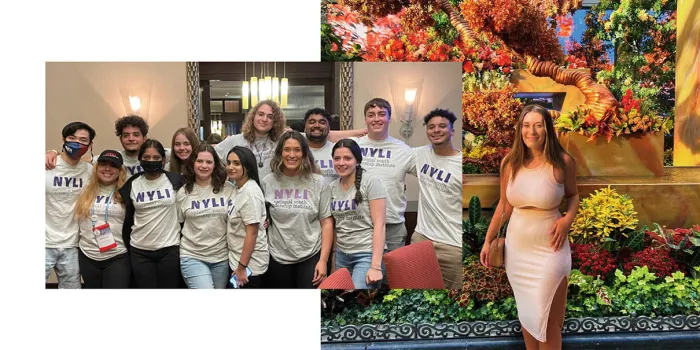When you have a rare disorder, it can be isolating. Gabi Flores, 22, knows that feeling all too well, as it wasn’t until she was 14 that she finally learned she had qualitative platelet dysfunction. “It was a relief to finally get the diagnosis, but it was a little bit tough. I grew up in the community because my mother has a bleeding disorder, so I understood hemophilia and von Willebrand disease. But I had never even heard of my diagnosis, so it was completely new territory to me,” says the senior at the University of Colorado Denver.
What really helped was the community Gabi found in the National Hemophilia Foundation and its National Youth Leadership Institute (NYLI), a two-year program that provides young adults ages 18 to 24 with tools and training to encourage personal growth, effect change, and positively influence others. “NYLI has given me so much, a true support system. It’s like a big family, and I have met some of my best friends there,” Gabi says.
Struggling for a Diagnosis
Growing up in a suburb of St. Louis, Gabi experienced a lot of significant bruising. When her period began at age 11, she had abnormally long and heavy flows. At one point, she menstruated for six months straight. Since there was a family history of hemophilia, she was tested for that and von Willebrand disease, but both came up negative.
“They kept saying I didn’t have a bleeding disorder, but they couldn’t identify what was the matter,” she recalls. It wasn’t until she was brought to a clinic in Kansas City, Missouri, that the rare qualitative platelet dysfunction was uncovered. But even then, her life wasn’t easy, as the treatment for it isn’t clear-cut. Her treatment plan has changed over the years. Right now, she has an intrauterine device and uses desmopressin injections.
Living Life to Fullest, Smartly
Gabi didn’t let her unique diagnosis limit her. She was an active soccer player, and a goalkeeper to boot. “Not the most ideal thing for a bleeding disorder,” she says with a laugh. But her mother encouraged her to continue playing as long as she took her health seriously and communicated honestly with her health care providers. Today, Gabi is healthy and still active.
In 2016, she attended an NHF conference where she first learned about NYLI. She was too young to join then, but she always knew she would when the time came. “They looked like they were having so much fun, and I knew I wanted to give back to the community that gave me so much,” she says.
In 2021, Gabi joined NYLI with an interest in advocacy, which fits with her long-term career goals. As a political science major, she wants to become a lobbyist, possibly in the medical field.
“NYLI has given me some great professional advancement opportunities and experiences,” she says. “I am on the NHF Board of Directors as the NYLI representative, I have gone to Washington, D.C., to lobby, and I have spoken at conferences about rare disorders. It’s prepared me a lot for the professional world.”
She adds, “A lot of people with rare disorders don’t think that there’s a place for them. I encourage them to get involved, because our community is growing, and our voices are being heard.”

